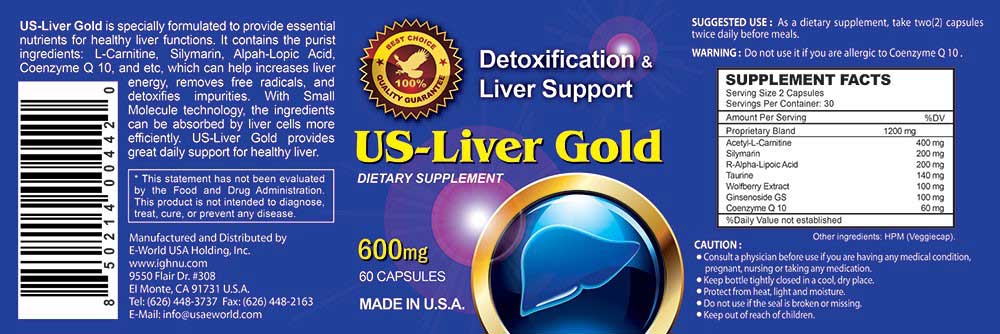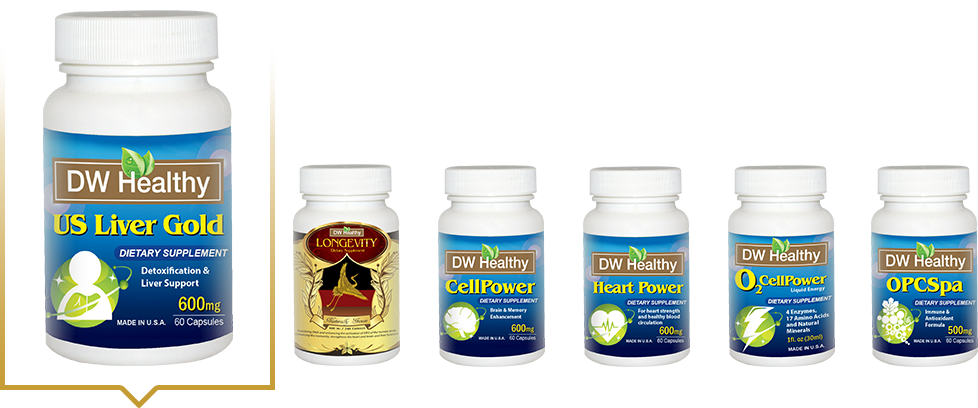Liver Gold
DW Healthy’s US Liver Gold is a scientifically formulated, highly developed small molecular technology supplement made from the highest quality natural plant extracts. Its unique proprietary formula is designed it help increase liver energy, improve the immune system by removing free radicals and assist with the detoxification process at the cellular level. The small molecular technology is designed to be more readily absorbed by liver cells, thus increasing the effectiveness and supporting overall liver health. †
The Science Behind DW US Liver Gold
DW Healthy’s US Liver Gold small molecular technology is designed to function at a cellular level, penetrating the cell membrane, nurturing mitochondria and improving the overall health of human liver cells. Its unique proprietary formula combines the superior ingredients of Acetyl-L-Carnitine, Silymarin, Coenzymes Q10, Alpha-Lipoic Acid, Taurine, Wolfberry Extract, and Ginsencside GS; ingredients believed to provide a host of benefits including the treatment of liver disease, viral hepatitis, and even the ability to stop some cancer cells from dividing and reproducing in vitro.†

Ingredients
- Acetyl-L-Carnitine
- Silymarin
- R-Alpha-Lipoic Acid
- Taurine
- Wolfberry Extract
- Ginsenoside GS
- Coenzyme Q10
Potentially effective for
- Liver Disease (caused by viruses or alcohol)
- Diabetes
- Cirrhosis (liver scarring)
- Hepatitis
Acetyl-L-Carnitine
It is an amino acid that is naturally produced by the body and helps your body produce energy. It is sometimes referred to as ALCAR. It is the processed form of L-Carnitine, and is synthesized in the human brain, liver, and kidney by the enzyme ALC-transferase. It facilitates the uptake of acetyl CoA into the mitochondria during fatty acid metablism, enhances acetylcholine production, and stimulates protein and membrane phospholipid synthesis.
Although the exact mechanisms of action of Acetyl-L-Carnitine are currently unknown, research indicates they may be related to its cholinergic neural transmission activity, and its ability to enhance neuronal metabolism in the mitochondria. Because of the cholinergic effects, the blocking of post-synaptic inhibition potentials, or the direct stimulation of the synapses as to enhanced cellular energetic in the mitochondria, human studies show ALCA has the ability to stabilize cell membrane fluidity via regulation of sphingomyelin levels, and also provides a substarate reservoir for cellular energy production, thereby preventing excessive neuronal cell death. It has also been shown to increase hippocampal binding of glucocorticoids and nerve growth factor. ALCR reduces oxidative stress and inhibits excitotoxicity in brain tissue and CSF, thought to thereby prevent cell death and ischemia-induced neuronal damage. ALCR may benefit peripheral nerve regeneration and its ability to reduce blood glutamate levels, thereby reducing the neurotoxicity of nucleoside analog medications.
Liver Protector
In a recent Italian study, researchers discovered that Acetyl-L-Carnitine can improve liver function and possibly support the microstructure of liver tissue specifically. The study was done on individuals with inflamed fatty livers. The Acetyl-L-Carnitine had a protective effect on the liver that prevented toxic build up.
Diabetes
The results of the Italian study turned out to be impressive as the participants who had taken Acetyl-L-Carnitine had lower levels of enzymes, improved blood sugar control, lower levels of insulin resistance.
- http://www.ivlproducts.com/Health-Library/Health-Concerns/Immune-Support/Acetyl-L-Carnitine-for-Healthy-Liver-Function/
- http://lpi.oregonstate.edu/mic/dietary-factors/L-carnitine (general acetyl-l-carnitine information)
- http://www.uofmhealth.org/health-library/hn-2795007 (strong research on diabetes)
Heart Conditions
Some good evidence shows that carnitine can be used along with conventional treatment for stable angina. A few small studies have also shown that carnitine may also help when used with medicine for heart attack and some small studies suggest that carnitine can reduce symptoms of heart failure, these studies are still insufficient however.
Peripheral Vascular Disease
Several studies have shown that carnitine can reduce the symptoms of peripheral vascular disease.
Alzheimer Disease
Carnitine is still being studied for the treatment of Alzheimer's disease. Several studies show that carnitine might slow down the progression of Alzheimer, but other studies showed the opposite. The research is still mixed and unknown.
Silymarin
Silymarin is a unique flavonoid complex that is derived from the milk thistle plant. It has been the subject of decades of research regarding the beneficial properties it contains. It is simply the purified extract of the fruits (seeds) of the milk thistle plant. It is responsible for the main medical benefits of the milk thistle plant, and it is made up of three main flavonoids: 1) silybin – also know as silibinin, 2) silydianin – also known as silidianin and 3) silychristin – also know as silicristin. As with other flavonoids, it is a powerful antioxidant which works to maintain health and energy by protecting the body from damage caused by free radicals and lipid peroxidation, which can injure healthy cells and tissues. Just as grapes and red wine, for example, are touted as excellent sources of antioxidants, Silymarin also contains the properties needed to offer the body the same antioxidant benefits.
Silymarin also helps with the regeneration of liver cells, as well as acting as a decongestant; stimulating bile flow through the liver and gallbladder thus reducing stagnation and assisting in the prevention of the formation of gallstones and bile-induced liver damage.†
Liver Disease
Multiple studies from Europe have suggested that oral milk thistle may benefit those with cirrhosis. In studies of up to five years long, milk thistle has improved liver function. Silymarin has antioxidant and anti-inflammatory properties, and it may help the liver repair itself by growing new cells. Milk thistle is often suggested as a treatment for alcoholic hepatitis and alcoholic cirrhosis. Most studies show milk thistle improves liver function and increases survival in people with cirrhosis or chronic hepatitis.
Diabetes
Silymarin improves blood and urine makers. Silymarin has also shown to improve blood sugar in people with diabetes as well as liver disease.
Cancer Cells Prevention
Early laboratory studies also suggest that silymarin and other active substances in milk thistle may have anticancer effects. These substances appear to stop cancer cells from dividing and reproducing, shorten their lifespan, and reduce blood supply to tumors.
- http://umm.edu/health/medical/altmed/herb/milk-thistle (liver disease & cancer cells)
- http://www.mayoclinic.org/drugs-supplements/milk-thistle/evidence/hrb-20059806 (liver disease & diabetes)
- http://www.cancer.gov/about-cancer/treatment/cam/patient/milk-thistle-pdq (cancer cells)
- http://www.mayoclinic.org/drugs-supplements/milk-thistle/evidence/hrb-20059806
- http://www.ncbi.nlm.nih.gov/pubmed/21466434 (prevention and treatment of liver diseases and primary liver cancer)
- http://www.ncbi.nlm.nih.gov/pubmed/11735632 (treatment of liver disease)
- http://www.liversupport.com/milkthistle.htm
R-Alpha-Lipoic Acid
Has shown to act as an antioxidant and help protect against free radicals and inflammation in the body. It is a naturally occurring compound that is synthesized in small amounts by plants and animals, including humans. LA also contains an asymmetric carbon, meaning there are two possible optical isomers that are mirror images of each other (R-LA and S-LA). Only the R- isomer is endogenously synthesized and bound to protein: R-LA occurs natural in foods. LA supplements may contain either R-LA or a 50/50 mixture of R-LA and S-LA. DW Healthy uses 100% R-LA. There may be additional differences as well in the bioavailabilty of the two isomers of LA. After oral dosing, peak plasma concentrations of R-LA were found to be 40-50% higher than S-LA, suggesting that R-LA is better absorbed (12,14,16). In rats, R-LA was more effective than S-LA in enhancing insulin-stimulated glucose transport and metabolism in skeletal muscle (50), and R-LA was more effective than LA and S-LA in preventing cataracts (93).
Liver Protection & Regeneration
Alpha Lipoic Acid is an antioxidant that is used to protect the liver since it is both fat and water soluble. Because of this antioxidant can bind with free radicals in a lean liver or in a fatty liver, and it can confer free radical protection to both interior and exterior cellular structures.
When it comes to regeneration of the liver, antioxidants are typically depleted as they attack free radicals, but there is evidence that ALA may help to regenerate other antioxidants so they can function once again. Such a capability is highly desired when constant liver inflammation threatens to form new free radicals. ALA also boosts Glutathione, A primary function of ALA is to increase the body’s production of glutathione, which helps dissolve toxic substances in the liver. ALA also helps reduce liver enzymes. According to research from the 1970s by Drs. Fredrick C. Bartter and Burton M. Berkson, ALA restores liver enzyme levels back to normal.
- http://www.liversupport.com/helping-your-liver-with-alpha-r-lipoic-acid/
- http://www.advance-health.com/rlipoicacid.html (R Alpha Lipoic Acid, Retrieved July 5, 2009, Clear Springs Press, LLC, 2009)
- http://www.lifeextension.com/magazine/2007/10/nu_lipoic_acid/page-01
- http://www.ncbi.nlm.nih.gov/pubmed/9607614 (Alpha-lipoic acid in liver metabolism and disease, Bustamante J, et al, Retrieved July 5, 2009, Free Radical Biology & Medicine, April 1998)
- http://www.rice.edu/~jenky/sports/antiox.html (Antioxidants and Free Radicals, Retrieved July 5, 2009, Rice University, 2009)
- http://www.townsendletter.com/Dec2007/alphalipo1207.htm (Alpha Lipoic Acid and Liver Disease, Burton M. Berkson, MD, MS, PhD, Retrieved July 5, 2009, Townsend Letter, December 2007)
- http://www.umm.edu/altmed/articles/alpha-lipoic-000285.htm (Alpha-lipoic Acid, Retrieved July 5, 2009, University of Maryland Medical Center, 2009)
Taurine
Taurine is an amino acid that supports neurological development and helps regulate the level of water and minerals in the blood. Taurine is also thought to have antioxidant properties. It is found in large amounts in the brain, retina, heart, and blood cells called platelets. Taurine is essential for cardiovascular function, and development and function of skeletal muscle, the retina, and the central nervous system.
Liver Protection
Taurine is an important protective substance that helps prevent liver damage from occurring during the performance of the liver’s detoxification function. It also helps prevent the development of liver fibrosis and/or fatty liver that can occur as a common response to chronic liver injury. The researchers identified the protective mechanism as being the inhibition of proliferation of hepatic stellate cells which generate the extracellular matrix that makes up the fibrotic tissue in the damaged liver..
- http://www.life-enhancement.com/magazine/article/3167-taurine-protects-the-liver-from-acetaminophen-induced-liver-failure (liver protection)
- http://www.lifeextension.com/magazine/2013/6/The-Forgotten-Longevity-Benefits-of-Taurine/Page-01
Cardiovascular Health
Taurine was found to exhibit diverse biological actions, including protection against ischemia-reperfusion injury, modulation of intracellular calcium concentration, and antioxidant, antiatherogenic and blood pressure-lowering effects. Taurine may be beneficial against ischemia-reperfusion, CHF, and diabetes.
- http://www.ncbi.nlm.nih.gov/pmc/articles/PMC2586397/ (The potential health benefits of taurine in cardiovascular disease)
- http://www.jbiomedsci.com/content/17/S1/S6 (Cardiovascular disease)
Wolfberry Extract
The wolfberry fruit has been used in traditional Chinese medicine (TCM) for more than 2000 years, and its use was first recorded around 200 BCE in Shen Nong Ben Cao Jing. In the very long history of the traditional use of wolfberry, there are practically no reports of adverse effects. Wolfberry contains betaine, which is a known liver protectant.
Liver Detox / Liver Fatty Disease
Wolfberry contains betaine, which is a known liver protectant. Betaine increases choline production in the liver, prevents fatty liver disease and detoxifies the liver.
Longevity
Wolfberry's protecting and detoxing elements preserve the body by fighting free radicals and in turn bringing about longevity to the body.
Immunity
A Chinese study showed the improvement on immunity on an experiment that involved lacto-wolfberry. In the experiment a group of older Chinese subjects supplemented with lacto-wolfberry for 3 months. At the end of the three months the subjects were vaccinated with the influenza vaccine. The lacto-wolfberry responded positively to the vaccine with increased levels of antibodies and with little reaction of the vaccine.
- http://www.research.nestle.com/newscenter/news/atraditionalchineseingredientwithimmunebenefitsfortheelderly (immunity research)
- http://www.ncbi.nlm.nih.gov/books/NBK92756/ (potential benefits of wolfberry)
- http://www.uofmhealth.org/health-library/hn-5198007 (benefits of wolfberry)
Ginsenoside GS
Ginsenosides are found nearly exclusively in Panax species (ginseng). They have been the target of signifficant research as they are believed to be the main active principles behind the claims of ginsengs efficacy. The potential health effects include anticarcinogenic, immunomodulatory, anti-inflammatory, antiallergic, antiatherosclerotic, antihypertensive, and antidiabetic effects as well as antistress activity and effects on the central nervous system. Ginsensoides can be metabolized in the stomach (acid hydrolysis) and in the gastrointestinal tract (bacterial hydrolysis). Panax ginseng (Renshen, Chinese ginseng) is commonly used either by itself or in combination with other medicinal ingredients as a key herb in Chinese medicine. A member of the Araliaceae family, the genus name Panax was derived from the Greek word meaning "all-healing" first coined by the Russian botanist Carl A. Meyer.
Liver Protection
Ginseng extracts have been reported to show protective effects on hepatocytes in vitro and liver injury in various animal, and clinical models induced by a wide variety of hepatotoxins including hydrogen peroxide (H2O2), alcohol, carbon tetrachloride (CCl4), aflatoxin B1, fumonisins, tert-butylhydroperoxide (t-BHP), cadmium chloride (CdCl2), benzo[alpha]pyrene (BP), 2,3,7,8-tetrachlorodibenzo-p-dioxin, lipopolysaccharide, diethylnitrosamine, galactosamine (GalN), bromobenzene, xenobiotics, and mercuric chloride. Ginseng has also found to protect liver cells from radiation and viral hepatitis.
Ginseng is beneficial in the treatment of acute graft-versus-host disease, a rare complication after liver transplantation with an extremely poor prognosis. On the other hand, red ginseng is markedly effective in liver regeneration after partial hepatectomy in rats (70%) and dogs (40%) by increase of the liver weight and acceleration of hepatocyte proliferation.
Liver Cancer
Ginseng has been evaluated as a chemopreventive therapy against HCC. Results of epidemiological studies of ginseng intake and cancer cases (4600 patients) show that those who take ginseng are less likely to contract various cancers such as cancer of the stomach, liver, and lung than those who do not take it, and that increased intake leads to a lesser ratio of danger, proving its usefulness for primary prevention. In a clinical survey, the prolonged administration of red ginseng extract significantly inhibits the incidence of hepatoma and also proliferation of pulmonary tumors induced by aflatoxin B1 and urethane. Recently, another clinical research reported that ginseng administration induced a significant improvement in liver function tests, decreased the tumor marker levels, and decreased the viral titers in HCV (hepatitis C virus) patients, supporting powerful therapeutic effects against HCV and liver cancer.
- http://www.hindawi.com/journals/ecam/2012/173297/
- http://www.cmjournal.org/content/pdf/1749-8546-5-20.pdf (Pharmacology of ginsenosides: a literature review)
Coenzyme Q10 (CoQ10)
Functions as an antioxidant that protects cells at a molecular level; it is a substance similar to that of a vitamin that exists in every cell of our body’s. Our cells use it for growth and maintenance; using it to produce energy our bodies need.
http://www.nlm.nih.gov/medlineplus/druginfo/natural/938.html
Liver Protection
Functions as an antioxidant that protects cells at a molecular level; it is a substance similar to that of a vitamin that exists in every cell of our body’s. Our cells use it for growth and maintenance; using it to produce energy our bodies need.
Immunity
CoQ10 seems to improve immunity in people.
†This statement has not been evaluated by the Food and Drug Administration. This product is not intended to diagnose, treat, cure or prevent disease.


